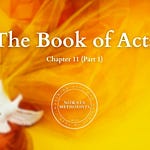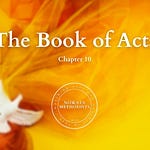What was the high point of Israelite history? For many, it was the early days of Solomon’s reign. This time of great wealth and honor was quite impressive for the little Kingdom. Suddenly it seems to have been the center of the world, with the nations coming to give honor the LORD and his anointed king, just as prophecies laid out would be the fulfillment of God’s purposes in the world. The Temple was built and completed, and God promised to put his Name there forever.
Sadly, there have been many chapters since then. Lots of betrayal and abandonment towards the Lord. Lots of punishment from the Lord, successful only in bringing about small times of contrition.
While it is sad, it isn’t unfortunate. The insufficiency of Solomon’s reign resulted in a perfect man coming to fulfill what Solomon could not. It is only because of the failure of those who came before that the coming of Jesus accomplished what it did.
Don’t miss the former times, the times when things we easier, when you had more money and comfort, when you had more friends. These things do not save. It is God alone who saves. Put your trust in him rather than friends, family, or fortune. That is where true eternal joy lies.
1 Kings 6
In the four hundred and eightieth year after the Israelites had come out of the land of Egypt, in the month of Ziv, the second month of the fourth year of Solomon’s reign over Israel, he began to build the house of the LORD.
The house that King Solomon built for the LORD was sixty cubits long, twenty cubits wide, and thirty cubits high.
The portico at the front of the main hall of the temple was twenty cubits long, extending across the width of the temple and projecting out ten cubits in front of the temple.
He also had narrow windows framed high in the temple.
Against the walls of the temple and the inner sanctuary, Solomon built a chambered structure around the temple, in which he constructed the side rooms.
The bottom floor was five cubits wide, the middle floor six cubits, and the third floor seven cubits. He also placed offset ledges around the outside of the temple, so that nothing would be inserted into its walls.
The temple was constructed using finished stones cut at the quarry, so that no hammer or chisel or any other iron tool was heard in the temple while it was being built.
The entrance to the bottom floor was on the south side of the temple. A stairway led up to the middle level, and from there to the third floor.
So Solomon built the temple and finished it, roofing it with beams and planks of cedar.
He built chambers all along the temple, each five cubits high and attached to the temple with beams of cedar.
Then the word of the LORD came to Solomon, saying:
“As for this temple you are building, if you walk in My statutes, carry out My ordinances, and keep all My commandments by walking in them, I will fulfill through you the promise I made to your father David.
And I will dwell among the Israelites and will not abandon My people Israel.”
So Solomon built the temple and finished it.
He lined the interior walls with cedar paneling from the floor of the temple to the ceiling, and he covered the floor with cypress boards.
He partitioned off the twenty cubits at the rear of the temple with cedar boards from floor to ceiling to form within the temple an inner sanctuary, the Most Holy Place.
And the main hall in front of this room was forty cubits long.
The cedar paneling inside the temple was carved with gourds and open flowers. Everything was cedar; not a stone could be seen.
Solomon also prepared the inner sanctuary within the temple to set the ark of the covenant of the LORD there.
The inner sanctuary was twenty cubits long, twenty cubits wide, and twenty cubits high. He overlaid the inside with pure gold, and he also overlaid the altar of cedar.
So Solomon overlaid the inside of the temple with pure gold, and he extended gold chains across the front of the inner sanctuary, which was overlaid with gold.
So he overlaid with gold the whole interior of the temple, until everything was completely finished. He also overlaid with gold the entire altar that belonged to the inner sanctuary.
In the inner sanctuary he made two cherubim, each ten cubits high, out of olive wood.
One wing of the first cherub was five cubits long, and the other wing was five cubits long as well. So the full wingspan was ten cubits.
The second cherub also measured ten cubits; both cherubim had the same size and shape, and the height of each cherub was ten cubits.
And he placed the cherubim inside the innermost room of the temple. Since their wings were spread out, the wing of the first cherub touched one wall, while the wing of the second cherub touched the other wall, and in the middle of the room their wingtips touched.
He also overlaid the cherubim with gold.
Then he carved the walls all around the temple, in both the inner and outer sanctuaries, with carved engravings of cherubim, palm trees, and open flowers.
And he overlaid the temple floor with gold in both the inner and outer sanctuaries.
For the entrance to the inner sanctuary, Solomon constructed doors of olive wood with five-sided doorposts.
The double doors were made of olive wood, and he carved into them cherubim, palm trees, and open flowers and overlaid the cherubim and palm trees with hammered gold.
In the same way he made four-sided doorposts of olive wood for the sanctuary entrance. The two doors were made of cypress wood, and each had two folding panels.
He carved into them cherubim, palm trees, and open flowers; and he overlaid them with gold, hammered evenly over the carvings.
Solomon built the inner courtyard with three rows of dressed stone and one row of trimmed cedar beams.
The foundation of the house of the LORD was laid in the fourth year of Solomon’s reign, in the month of Ziv.
In his eleventh year and eighth month, the month of Bul, the temple was finished in every detail and according to every specification. So he built the temple in seven years.
1 Kings 7
Solomon, however, took thirteen years to complete the construction of his entire palace.
He built the House of the Forest of Lebanon a hundred cubits long, fifty cubits wide, and thirty cubits high, with four rows of cedar pillars supporting the cedar beams.
The house was roofed with cedar above the beams that rested on the pillars—forty-five beams, fifteen per row.
There were three rows of high windows facing one another in three tiers. All the doorways had rectangular frames, with the openings facing one another in three tiers.
Solomon made his colonnade fifty cubits long and thirty cubits wide, with a portico in front of it and a canopy with pillars in front of the portico.
In addition, he built a hall for the throne, the Hall of Justice, where he was to judge. It was paneled with cedar from floor to ceiling.
And the palace where Solomon would live, set further back, was of similar construction. He also made a palace like this hall for Pharaoh’s daughter, whom he had married.
All these buildings were constructed with costly stones, cut to size and trimmed with saws inside and out from the foundation to the eaves, and from the outside to the great courtyard.
The foundations were laid with large, costly stones, some ten cubits long and some eight cubits long. Above these were high-grade stones, cut to size, and cedar beams.
The great courtyard was surrounded by three rows of dressed stone and a row of trimmed cedar beams, as were the inner courtyard and portico of the house of the LORD.
Now King Solomon sent to bring Huram from Tyre.
He was the son of a widow from the tribe of Naphtali, and his father was a man of Tyre, a craftsman in bronze. Huram had great skill, understanding, and knowledge for every kind of bronze work. So he came to King Solomon and carried out all his work.
He cast two pillars of bronze, each eighteen cubits high and twelve cubits in circumference.
He also made two capitals of cast bronze to set on top of the pillars, each capital five cubits high.
For the capitals on top of the pillars he made a network of lattice, with wreaths of chainwork, seven for each capital.
Likewise, he made the pillars with two rows of pomegranates around each grating to cover each capital atop the pillars.
And the capitals atop the pillars in the portico were shaped like lilies, four cubits high.
On the capitals of both pillars, just above the rounded projection next to the network, were the two hundred pomegranates in rows encircling each capital.
Thus he set up the pillars at the portico of the temple. The pillar to the south he named Jachin, and the pillar to the north he named Boaz.
And the tops of the pillars were shaped like lilies. So the work of the pillars was completed.
He also made the Sea of cast metal. It was circular in shape, measuring ten cubits from rim to rim, five cubits in height, and thirty cubits in circumference.
Below the rim, ornamental buds encircled it, ten per cubit all the way around the Sea, cast in two rows as a part of the Sea.
The Sea stood on twelve oxen, three facing north, three facing west, three facing south, and three facing east. The Sea rested on them, with all their hindquarters toward the center.
It was a handbreadth thick, and its rim was fashioned like the brim of a cup, like a lily blossom. It could hold two thousand baths.
In addition, he made ten movable stands of bronze, each four cubits long, four cubits wide, and three cubits high.
This was the design of the stands: They had side panels attached to uprights,
and on the panels between the uprights were lions, oxen, and cherubim. On the uprights was a pedestal above, and below the lions and oxen were wreaths of beveled work.
Each stand had four bronze wheels with bronze axles and a basin resting on four supports, with wreaths at each side.
The opening to each stand inside the crown at the top was one cubit deep, with a round opening like the design of a pedestal, a cubit and a half wide. And around its opening were engravings, but the panels of the stands were square, not round.
There were four wheels under the panels, and the axles of the wheels were attached to the stand; each wheel was a cubit and a half in diameter.
The wheels were made like chariot wheels; their axles, rims, spokes, and hubs were all of cast metal.
Each stand had four handles, one for each corner, projecting from the stand.
At the top of each stand was a circular band half a cubit high. The supports and panels were cast as a unit with the top of the stand.
He engraved cherubim, lions, and palm trees on the surfaces of the supports and panels, wherever each had space, with wreaths all around.
In this way he made the ten stands, each with the same casting, dimensions, and shape.
He also made ten bronze basins, each holding forty baths and measuring four cubits across, one basin for each of the ten stands.
He set five stands on the south side of the temple and five on the north, and he put the Sea on the south side, at the southeast corner of the temple.
Additionally, Huram made the pots, shovels, and sprinkling bowls.
So Huram finished all the work that he had undertaken for King Solomon in the house of the LORD:
the two pillars;
the two bowl-shaped capitals atop the pillars;
the two sets of network covering both bowls of the capitals atop the pillars;
the four hundred pomegranates for the two sets of network (two rows of pomegranates for each network covering both the bowl-shaped capitals atop the pillars);
the ten stands;
the ten basins on the stands;
the Sea;
the twelve oxen underneath the Sea;
and the pots, shovels, and sprinkling bowls.
All the articles that Huram made for King Solomon in the house of the LORD were made of burnished bronze.
The king had them cast in clay molds in the plain of the Jordan between Succoth and Zarethan.
Solomon left all these articles unweighed, because there were so many. The weight of the bronze could not be determined.
Solomon also made all the furnishings for the house of the LORD:
the golden altar;
the golden table on which was placed the Bread of the Presence;
the lampstands of pure gold in front of the inner sanctuary, five on the right side and five on the left;
the gold flowers, lamps, and tongs;
the pure gold basins, wick trimmers, sprinkling bowls, ladles, and censers;
and the gold hinges for the doors of the inner temple (that is, the Most Holy Place ) as well as for the doors of the main hall of the temple.
So all the work that King Solomon had performed for the house of the LORD was completed.
Then Solomon brought in the items his father David had dedicated—the silver, the gold, and the furnishings—and he placed them in the treasuries of the house of the LORD.
1 Kings 8
At that time Solomon assembled before him in Jerusalem the elders of Israel—all the tribal heads and family leaders of the Israelites—to bring up the ark of the covenant of the LORD from Zion, the City of David.
And all the men of Israel came together to King Solomon at the feast in the seventh month, the month of Ethanim.
When all the elders of Israel had arrived, the priests took up the ark,
and they brought up the ark of the LORD and the Tent of Meeting with all its sacred furnishings. So the priests and Levites carried them up.
There, before the ark, King Solomon and the whole congregation of Israel who had assembled with him sacrificed so many sheep and oxen that they could not be counted or numbered.
Then the priests brought the ark of the covenant of the LORD to its place in the inner sanctuary of the temple, the Most Holy Place, beneath the wings of the cherubim.
For the cherubim spread their wings over the place of the ark and overshadowed the ark and its poles.
The poles extended far enough that their ends were visible from the Holy Place in front of the inner sanctuary, but not from outside the Holy Place; and they are there to this day.
There was nothing in the ark except the two stone tablets that Moses had placed in it at Horeb, where the LORD had made a covenant with the Israelites after they had come out of the land of Egypt.
And when the priests came out of the Holy Place, the cloud filled the house of the LORD
so that the priests could not stand there to minister because of the cloud; for the glory of the LORD filled the house of the LORD.
Then Solomon declared:
“The LORD has said that He would dwell
in the thick cloud.
I have indeed built You an exalted house,
a place for You to dwell forever.”
And as the whole assembly of Israel stood there, the king turned around and blessed them all and said:
“Blessed be the LORD, the God of Israel, who has fulfilled with His own hand what He spoke with His mouth to my father David, saying,
‘Since the day I brought My people Israel out of Egypt, I have not chosen a city from any tribe of Israel in which to build a house so that My Name would be there. But I have chosen David to be over My people Israel.’
Now it was in the heart of my father David to build a house for the Name of the LORD, the God of Israel.
But the LORD said to my father David, ‘Since it was in your heart to build a house for My Name, you have done well to have this in your heart.
Nevertheless, you are not the one to build it; but your son, your own offspring, will build the house for My Name.’
Now the LORD has fulfilled the word that He spoke. I have succeeded my father David, and I sit on the throne of Israel, as the LORD promised. I have built the house for the Name of the LORD, the God of Israel.
And there I have provided a place for the ark, which contains the covenant of the LORD that He made with our fathers when He brought them out of the land of Egypt.”
Then Solomon stood before the altar of the LORD in front of the whole assembly of Israel, spread out his hands toward heaven, and said:
“O LORD, God of Israel, there is no God like You in heaven above or on earth below, keeping Your covenant of loving devotion with Your servants who walk before You with all their hearts.
You have kept Your promise to Your servant, my father David. What You spoke with Your mouth You have fulfilled with Your hand this day.
Therefore now, O LORD, God of Israel, keep for Your servant, my father David, what You promised when You said: ‘You will never fail to have a man to sit before Me on the throne of Israel, if only your descendants guard their way to walk before Me as you have done.’
And now, O God of Israel, please confirm what You promised to Your servant, my father David.
But will God indeed dwell upon the earth? Even heaven, the highest heaven, cannot contain You, much less this temple I have built.
Yet regard the prayer and plea of Your servant, O LORD my God, so that You may hear the cry and the prayer that Your servant is praying before You today.
May Your eyes be open toward this temple night and day, toward the place of which You said, ‘My Name shall be there,’ so that You may hear the prayer that Your servant prays toward this place.
Hear the plea of Your servant and of Your people Israel when they pray toward this place. May You hear from heaven, Your dwelling place. May You hear and forgive.
When a man sins against his neighbor and is required to take an oath, and he comes to take an oath before Your altar in this temple,
then may You hear from heaven and act. May You judge Your servants, condemning the wicked man by bringing down on his own head what he has done, and justifying the righteous man by rewarding him according to his righteousness.
When Your people Israel are defeated before an enemy because they have sinned against You, and they return to You and confess Your name, praying and pleading with You in this temple,
then may You hear from heaven and forgive the sin of Your people Israel. May You restore them to the land You gave to their fathers.
When the skies are shut and there is no rain because Your people have sinned against You, and they pray toward this place and confess Your name, and they turn from their sins because You have afflicted them,
then may You hear from heaven and forgive the sin of Your servants, Your people Israel, so that You may teach them the good way in which they should walk. May You send rain on the land that You gave Your people as an inheritance.
When famine or plague comes upon the land, or blight or mildew or locusts or grasshoppers, or when their enemy besieges them in their cities, whatever plague or sickness may come,
then may whatever prayer or petition Your people Israel make—each knowing his own afflictions and spreading out his hands toward this temple—
be heard by You from heaven, Your dwelling place. And may You forgive and act, and repay each man according to all his ways, since You know his heart—for You alone know the hearts of all men—
so that they may fear You all the days they live in the land that You gave to our fathers.
And as for the foreigner who is not of Your people Israel but has come from a distant land because of Your name—
for they will hear of Your great name and mighty hand and outstretched arm—when he comes and prays toward this temple,
then may You hear from heaven, Your dwelling place, and do according to all for which the foreigner calls to You. Then all the peoples of the earth will know Your name and fear You, as do Your people Israel, and they will know that this house I have built is called by Your Name.
When Your people go to war against their enemies, wherever You send them, and when they pray to the LORD in the direction of the city You have chosen and the house I have built for Your Name,
then may You hear from heaven their prayer and their plea, and may You uphold their cause.
When they sin against You—for there is no one who does not sin—and You become angry with them and deliver them to an enemy who takes them as captives to his own land, whether far or near,
and when they come to their senses in the land to which they were taken, and they repent and plead with You in the land of their captors, saying, ‘We have sinned and done wrong; we have acted wickedly,’
and when they return to You with all their heart and soul in the land of the enemies who took them captive, and when they pray to You in the direction of the land that You gave to their fathers, the city You have chosen, and the house I have built for Your Name,
then may You hear from heaven, Your dwelling place, their prayer and petition, and may You uphold their cause.
May You forgive Your people who have sinned against You and all the transgressions they have committed against You, and may You grant them compassion in the eyes of their captors to show them mercy.
For they are Your people and Your inheritance; You brought them out of Egypt, out of the furnace for iron.
May Your eyes be open to the pleas of Your servant and of Your people Israel, and may You listen to them whenever they call to You.
For You, O Lord GOD, as Your inheritance, have set them apart from all the peoples of the earth, as You spoke through Your servant Moses when You brought our fathers out of Egypt.”
Now when Solomon had finished praying this entire prayer and petition to the LORD, he got up before the altar of the LORD, where he had been kneeling with his hands spread out toward heaven.
And he stood and blessed the whole assembly of Israel in a loud voice, saying:
“Blessed be the LORD, who has given rest to His people Israel according to all that He promised. Not one word has failed of all the good promises He made through His servant Moses.
May the LORD our God be with us, as He was with our fathers. May He never leave us nor forsake us.
May He incline our hearts to Himself, to walk in all His ways and to keep the commandments and statutes and ordinances He commanded our fathers.
And may these words with which I have made my petition before the LORD be near to the LORD our God day and night, so that He may uphold the cause of His servant and of His people Israel as each day requires,
so that all the peoples of the earth may know that the LORD is God. There is no other!
So let your heart be fully devoted to the LORD our God, as it is this day, to walk in His statutes and to keep His commandments.”
Then the king and all Israel with him offered sacrifices before the LORD.
And Solomon offered as peace offerings to the LORD 22,000 oxen and 120,000 sheep. So the king and all the Israelites dedicated the house of the LORD.
On that same day the king consecrated the middle of the courtyard in front of the house of the LORD, and there he offered the burnt offerings, the grain offerings, and the fat of the peace offerings, since the bronze altar before the LORD was too small to contain all these offerings.
So at that time Solomon and all Israel with him—a great assembly of people from Lebo-hamath to the Brook of Egypt—kept the feast before the LORD our God for seven days and seven more days—fourteen days in all.
On the fifteenth day Solomon sent the people away. So they blessed the king and went home, joyful and glad in heart for all the good things that the LORD had done for His servant David and for His people Israel.
1 Kings 9
Now when Solomon had finished building the house of the LORD and the royal palace, and had achieved all that he had desired to do, the LORD appeared to him a second time, as He had appeared to him at Gibeon.
And the LORD said to him:
“I have heard your prayer and petition before Me. I have consecrated this temple you have built by putting My Name there forever; My eyes and My heart will be there for all time.
And as for you, if you walk before Me as your father David walked, with a heart of integrity and uprightness, doing all I have commanded you, and if you keep My statutes and ordinances,
then I will establish your royal throne over Israel forever, as I promised your father David when I said, ‘You will never fail to have a man on the throne of Israel.’
But if indeed you or your sons turn away from following Me and do not keep the commandments and statutes I have set before you, and if you go off to serve and worship other gods,
then I will cut off Israel from the land that I have given them, and I will banish from My presence this temple I have sanctified for My Name. Then Israel will become an object of scorn and ridicule among all peoples.
And when this temple has become a heap of rubble, all who pass by it will be appalled and will hiss and say, ‘Why has the LORD done such a thing to this land and to this temple?’
And others will answer, ‘Because they have forsaken the LORD their God who brought their fathers out of the land of Egypt, and have embraced other gods, worshiping and serving them—because of this, the LORD has brought all this disaster upon them.’ ”
Now at the end of the twenty years during which Solomon built these two houses, the house of the LORD and the royal palace,
King Solomon gave twenty towns in the land of Galilee to Hiram king of Tyre, who had supplied him with cedar and cypress logs and gold for his every desire.
So Hiram went out from Tyre to inspect the towns that Solomon had given him, but he was not pleased with them.
“What are these towns you have given me, my brother?” asked Hiram, and he called them the Land of Cabul, as they are called to this day.
And Hiram had sent the king 120 talents of gold.
This is the account of the forced labor that King Solomon imposed to build the house of the LORD, his own palace, the supporting terraces, and the wall of Jerusalem, as well as Hazor, Megiddo, and Gezer.
Pharaoh king of Egypt had attacked and captured Gezer. He had set it on fire, killed the Canaanites who lived in the city, and given it as a dowry to his daughter, Solomon’s wife.
So Solomon rebuilt Gezer, Lower Beth-horon, Baalath, and Tamar in the Wilderness of Judah,
as well as all the store cities that Solomon had for his chariots and horses —whatever he desired to build in Jerusalem, Lebanon, and throughout the land of his dominion.
As for all the people who remained of the Amorites, Hittites, Perizzites, Hivites, and Jebusites (the people who were not Israelites)—
their descendants who remained in the land, those whom the Israelites were unable to devote to destruction —Solomon conscripted these people to be forced laborers, as they are to this day.
But Solomon did not consign any of the Israelites to slavery, because they were his men of war, his servants, his officers, his captains, and the commanders of his chariots and cavalry.
They were also the chief officers over Solomon’s projects: 550 supervisors over the people who did the work.
As soon as Pharaoh’s daughter had come up from the City of David to the palace that Solomon had built for her, he built the supporting terraces.
Three times a year Solomon offered burnt offerings and peace offerings on the altar he had built for the LORD, burning incense with them before the LORD. So he completed the temple.
King Solomon also assembled a fleet of ships at Ezion-geber, which is near Eloth in Edom, on the shore of the Red Sea.
And Hiram sent his servants, men who knew the sea, to serve in the fleet with Solomon’s servants.
They sailed to Ophir and imported gold from there—420 talents —and delivered it to Solomon.
1 Kings 10
Now when the queen of Sheba heard about the fame of Solomon concerning the name of the LORD, she came to test him with difficult questions.
She arrived in Jerusalem with a very large caravan—with camels bearing spices, gold in great abundance, and precious stones.
So she came to Solomon and spoke to him all that was on her mind. And Solomon answered all her questions; nothing was too difficult for the king to explain.
When the queen of Sheba saw all the wisdom of Solomon, the palace he had built,
the food at his table, the seating of his servants, the service and attire of his attendants and cupbearers, and the burnt offerings he presented at the house of the LORD, it took her breath away.
She said to the king, “The report I heard in my own country about your words and wisdom is true.
But I did not believe these things until I came and saw with my own eyes. Indeed, not even half was told to me. Your wisdom and prosperity have far exceeded the report I heard.
How blessed are your men! How blessed are these servants of yours who stand continually before you and hear your wisdom!
Blessed be the LORD your God, who has delighted in you to set you on the throne of Israel. Because of the LORD’s eternal love for Israel, He has made you king to carry out justice and righteousness.”
Then she gave the king 120 talents of gold, a great quantity of spices, and precious stones. Never again was such an abundance of spices brought in as those the queen of Sheba gave to King Solomon.
(The fleet of Hiram that brought gold from Ophir also brought from Ophir a great cargo of almug wood and precious stones.
The king made the almug wood into steps for the house of the LORD and for the king’s palace, and into lyres and harps for the singers. Never before had such almug wood been brought in, nor has such been seen to this day.)
King Solomon gave the queen of Sheba all she desired—whatever she asked—besides what he had given her out of his royal bounty. Then she left and returned to her own country, along with her servants.
The weight of gold that came to Solomon each year was 666 talents, not including the revenue from the merchants, traders, and all the Arabian kings and governors of the land.
King Solomon made two hundred large shields of hammered gold; six hundred shekels of gold went into each shield.
He also made three hundred small shields of hammered gold; three minas of gold went into each shield. And the king put them in the House of the Forest of Lebanon.
Additionally, the king made a great throne of ivory and overlaid it with pure gold.
The throne had six steps, and its back had a rounded top. There were armrests on both sides of the seat, with a lion standing beside each armrest.
Twelve lions stood on the six steps, one at either end of each step. Nothing like this had ever been made for any kingdom.
All King Solomon’s drinking cups were gold, and all the utensils of the House of the Forest of Lebanon were pure gold. There was no silver, because it was accounted as nothing in the days of Solomon.
For the king had the ships of Tarshish at sea with Hiram’s fleet, and once every three years the ships of Tarshish would arrive bearing gold, silver, ivory, apes, and peacocks.
So King Solomon surpassed all the kings of the earth in riches and wisdom. The whole world sought an audience with Solomon to hear the wisdom that God had put in his heart.
Year after year, each visitor would bring his tribute: articles of silver and gold, clothing, weapons, spices, horses, and mules.
Solomon accumulated 1,400 chariots and 12,000 horses, which he stationed in the chariot cities and also with him in Jerusalem.
The king made silver as common in Jerusalem as stones, and cedar as abundant as sycamore in the foothills.
Solomon’s horses were imported from Egypt and Kue; the royal merchants purchased them from Kue.
A chariot could be imported from Egypt for six hundred shekels of silver, and a horse for a hundred and fifty. Likewise, they exported them to all the kings of the Hittites and to the kings of Aram.
Proverbs 2
My son, if you accept my words
and hide my commandments within you,
if you incline your ear to wisdom
and direct your heart to understanding,
if you truly call out to insight
and lift your voice to understanding,
if you seek it like silver
and search it out like hidden treasure,
then you will discern the fear of the LORD
and discover the knowledge of God.
For the LORD gives wisdom;
from His mouth come knowledge and understanding.
He stores up sound wisdom for the upright;
He is a shield to those who walk with integrity,
to guard the paths of justice
and protect the way of His saints.
Then you will discern righteousness
and justice and equity—every good path.
For wisdom will enter your heart,
and knowledge will delight your soul.
Discretion will watch over you,
and understanding will guard you,
to deliver you from the way of evil,
from the man who speaks perversity,
from those who leave the straight paths
to walk in the ways of darkness,
from those who enjoy doing evil
and rejoice in the twistedness of evil,
whose paths are crooked
and whose ways are devious.
It will rescue you from the forbidden woman,
from the stranger with seductive words
who abandons the partner of her youth
and forgets the covenant of her God.
For her house sinks down to death,
and her tracks to the departed spirits.
None who go to her return
or negotiate the paths of life.
So you will follow in the ways of the good,
and keep to the paths of the righteous.
For the upright will inhabit the land,
and the blameless will remain in it;
but the wicked will be cut off from the land,
and the unfaithful will be uprooted.









